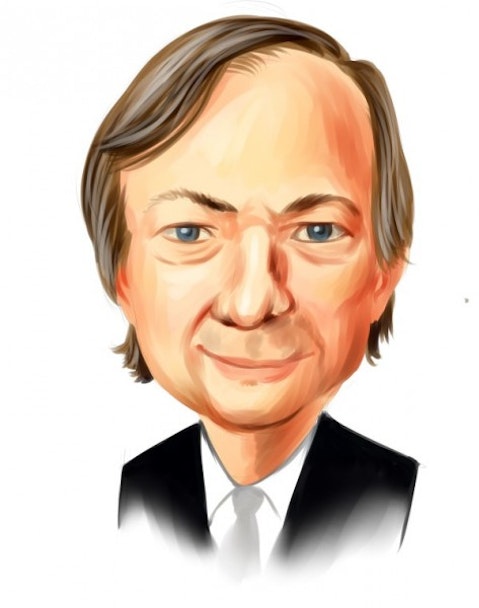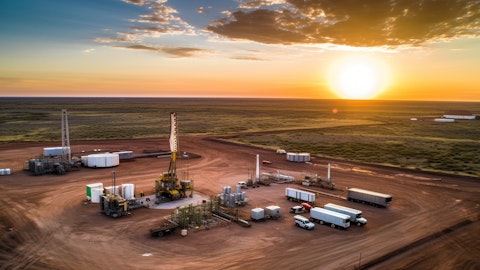In this article, we’ll explore the 10 Best Stocks to Buy According to Billionaire Ray Dalio.
Ray Dalio was born in 1949 and graduated from Long Island University in 1971. After a brief stint as a clerk on the New York Stock Exchange, he attended Harvard Business School and earned his MBA in 1973. That same year, he became the Director of Commodities at Dominick & Dominick LLC and later traded futures at Shearson Hayden Stone for a year. Dalio founded Bridgewater Associates in 1973 in his apartment. In July 2011, he stepped down as CEO but continued to work as a co-CIO alongside Robert Prince and Greg Jensen, taking on the title of “Mentor.”
Bridgewater Associates is notable for its focus on transparency and accountability. The firm promotes a culture where team members take responsibility for mistakes and learn from them. It encourages questioning and alignment, ensuring everyone regularly evaluates the validity of their ideas. This approach is crucial to the firm’s management style and investment strategies.
Ray Dalio Warns of U.S. Decline
Ray Dalio, founder of Bridgewater Associates, emphasized that since 1945, the United States has been the dominant global empire, but it is now in a state of relative decline. This decline isn’t just an opinion, it’s supported by concrete measures such as the nation’s share of global GDP, military strength, and the quality of its education system. These factors indicate that the U.S. is losing its position.
In addition to these, Dalio points out two other key elements that often disrupt world order: natural events like droughts, floods, and pandemics, which have historically caused more damage and upheaval than wars, and human creativity and technological innovation, which bring about substantial changes. Dalio believes all five factors are influencing the U.S. today. However, he stresses that the most critical issue is how people manage these challenges together.
The ability to address them intelligently and without creating further conflict is essential. If conflict arises, it could lead to a devastating outcome. But if people can come together and handle the situation effectively, the country can navigate these issues successfully. For Dalio, how society deals with one another is the number one factor in determining the future.
China Faces Economic Challenges and Urgent Need for Restructuring After Four Years of Change
In a recent Bloomberg interview, Ray Dalio also highlighted significant issues in China that have emerged over the past four years. He explained that China is in need of a major restructuring, as a large portion of individual spending, around 70%, was invested in real estate. With the decline in real estate, stocks, and salaries, people have become more cautious, reducing their spending and holding onto cash. In a deflationary environment, cash has become a relatively safe asset. This situation is affecting both households and businesses.
Dalio also pointed out that the government sector is facing serious challenges. Local governments, responsible for 83% of public spending, previously relied on land sales to generate revenue. With land sales drying up, these governments have accumulated significant debt, and now they’re struggling to pay it off. The key question is how to inject money into these local economies to keep them functioning. Dalio compared the situation to Japan’s struggles in 1990, noting that China’s challenges are even more severe and will require deep restructuring to resolve.
In addition to economic concerns, Dalio raised questions about property ownership and values. He referenced Deng Xiaoping’s famous statement, “It’s glorious to be rich,” and wondered if that sentiment still holds true in China today. The overall environment in the country is becoming more complex and difficult, as these economic and political issues intensify.
Dalio also emphasized the importance of being cautious when investing in China. He made it clear that every country goes through economic cycles, experiencing both highs and lows. According to Dalio, it’s crucial not to invest too heavily in any one country, including China, to avoid having it dominate your portfolio. Despite the challenges China faces, Dalio continues to invest there, but he stressed that the key consideration is the size and structure of the investment. Overall, his experience investing in China has been positive, though careful management is essential.
With that, let’s take a look at the 10 Best Stocks to Buy According to Billionaire Ray Dalio.

Ray Dalio of Bridgewater Associates
Our Methodology
We sifted through Bridgewater Associates’ Q2 2024 13F portfolio and picked the top 10 stocks held by the fund. We also added the total number of hedge fund investors per company, as of Q2 2024. The stocks are ranked in ascending order of Bridgewater Associates’ stake in them.
At Insider Monkey we are obsessed with the stocks that hedge funds pile into. The reason is simple: our research has shown that we can outperform the market by imitating the top stock picks of the best hedge funds. Our quarterly newsletter’s strategy selects 14 small-cap and large-cap stocks every quarter and has returned 275% since May 2014, beating its benchmark by 150 percentage points (see more details here).
10 Best Stocks to Buy According to Billionaire Ray Dalio
10. The Coca-Cola Company (NYSE:KO)
Total Number of Shares Owned: 5,146,875
Total Value of Shares Owned: $327,598,594
Number of Hedge Fund Investors: 68
The Coca-Cola Company (NYSE:KO) is an attractive investment option, especially after its impressive Q2 2024 results, which showed revenue of about $12 billion, up 10% from the previous year. This growth comes from strong demand for its wide range of beverages, including both sparkling and non-sparkling drinks, as well as a recovery in sales at restaurants and cafes as people return to dining out. The Coca-Cola Company (NYSE:KO) is also adapting to changing consumer preferences by introducing healthier drink options, which helps attract health-conscious customers.
With a robust global distribution network, The Coca-Cola Company (NYSE:KO) effectively reaches customers in both developed and emerging markets, ensuring steady sales. The Coca-Cola Company (NYSE:KO) commitment to sustainability, including efforts to reduce plastic waste, appeals to environmentally minded consumers. Additionally, The Coca-Cola Company (NYSE:KO) consistently pays dividends and has a track record of increasing them, making it appealing to investors looking for income.
Overall, The Coca-Cola Company (NYSE:KO)’s strong earnings growth, product innovations, effective distribution, sustainability efforts, and commitment to returning value to shareholders make it a solid choice for investors. Bridgewater Associates owns 5,146,875 shares of The Coca-Cola Company (NYSE:KO), valued at $327.6 million.
9. Costco Wholesale Corporation (NASDAQ:COST)
Total Number of Shares Owned: 440,819
Total Value of Shares Owned: $374,691,742
Number of Hedge Fund Investors: 71
Costco Wholesale Corporation (NASDAQ:COST) is an appealing investment due to its strong performance in Q2 2024, where it achieved around $57.2 billion in revenue, marking an 8% increase from the previous year, along with a 6% rise in same-store sales. A key strength of Costco Wholesale Corporation (NASDAQ:COST) is its membership model, which keeps renewal rates above 90%, ensuring a loyal customer base and steady income. By offering high-quality products at competitive prices, Costco Wholesale Corporation (NASDAQ:COST) attracts budget-conscious shoppers, especially during times of inflation.
Costco Wholesale Corporation (NASDAQ:COST) has also improved its online shopping experience, leading to significant growth in digital sales, which is likely to continue as more consumers shop online. Additionally, Costco Wholesale Corporation (NASDAQ:COST)’s efficient supply chain allows it to maintain low prices, further drawing in customers. With plans to open new warehouses, Costco Wholesale Corporation (NASDAQ:COST) is well-positioned for future growth.
Bridgewater Associates holds 440,819 shares of Costco Wholesale Corporation (NASDAQ:COST), valued at $374.7 million.





